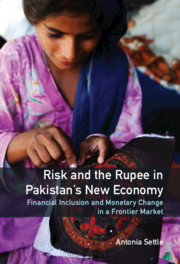 Risk and the Rupee in Pakistan's New Economy
Risk and the Rupee in Pakistan's New Economy Published online by Cambridge University Press: 31 March 2020
The extraordinary events associated with the global financial crisis of 2007–08 reflect rapid changes in money, banking and finance. Exotic financial instruments, ‘too big to fail’ banks and hasty deregulation feature heavily in debates ensuing from the crisis. Yet behind these somewhat spectacular concerns lie persistent but increasingly visible challenges to how we understand money and the central banking frameworks that attempt to govern money. This chapter introduces the global markets that are the backdrop of shifting currents in domestic money, by exploring the changing relationship between the state and money at the heights of global finance. In this, we find the transformation of money as burgeoning financial markets push at the bounds of central bank control over money, undermining the theoretical structures through which money and finance are understood and governed. Here we see money less in terms of its philosophical connotations and more in its application in financial markets; a perspective which is carried throughout the book's analysis. This exploration of money at the heights of global markets thereby sets the stage for later analysis by exploring the global context in which frontier money is borne through a perspective on money which is both grounded in finance theory and which addresses the increasingly strained relationship between the state and money.
The chapter opens by identifying the crucial role that state money plays in the financial architecture, as a benchmark for risk and liquidity. These benchmarking functions are intimately linked to notions of money as they are expressed in monetary and finance theory – for example, in asset pricing theory, endogenous and exogenous theories of money creation, and theories of monetary policy transmission – and (as we will see in later chapters) are implicit in central bank discourse and development policy. These depictions of state money demonstrate the uniqueness of money in conventional thinking, a uniqueness that, as Keynes explores in his description of money in the General Theory (1936), is tied to the state's sponsorship and control over money in the economy.
Framed in financial terms of risk and liquidity and cast against Keynes’ 1930s description of money, the chapter considers how the forces of globalisation have impacted this uniqueness of state money. This analysis explores money as increasingly fluid and ambiguous, and introduces the new challenges to policy and to theory that this predicament generates.
To save this book to your Kindle, first ensure no-reply@cambridge.org is added to your Approved Personal Document E-mail List under your Personal Document Settings on the Manage Your Content and Devices page of your Amazon account. Then enter the ‘name’ part of your Kindle email address below. Find out more about saving to your Kindle.
Note you can select to save to either the @free.kindle.com or @kindle.com variations. ‘@free.kindle.com’ emails are free but can only be saved to your device when it is connected to wi-fi. ‘@kindle.com’ emails can be delivered even when you are not connected to wi-fi, but note that service fees apply.
Find out more about the Kindle Personal Document Service.
To save content items to your account, please confirm that you agree to abide by our usage policies. If this is the first time you use this feature, you will be asked to authorise Cambridge Core to connect with your account. Find out more about saving content to Dropbox.
To save content items to your account, please confirm that you agree to abide by our usage policies. If this is the first time you use this feature, you will be asked to authorise Cambridge Core to connect with your account. Find out more about saving content to Google Drive.